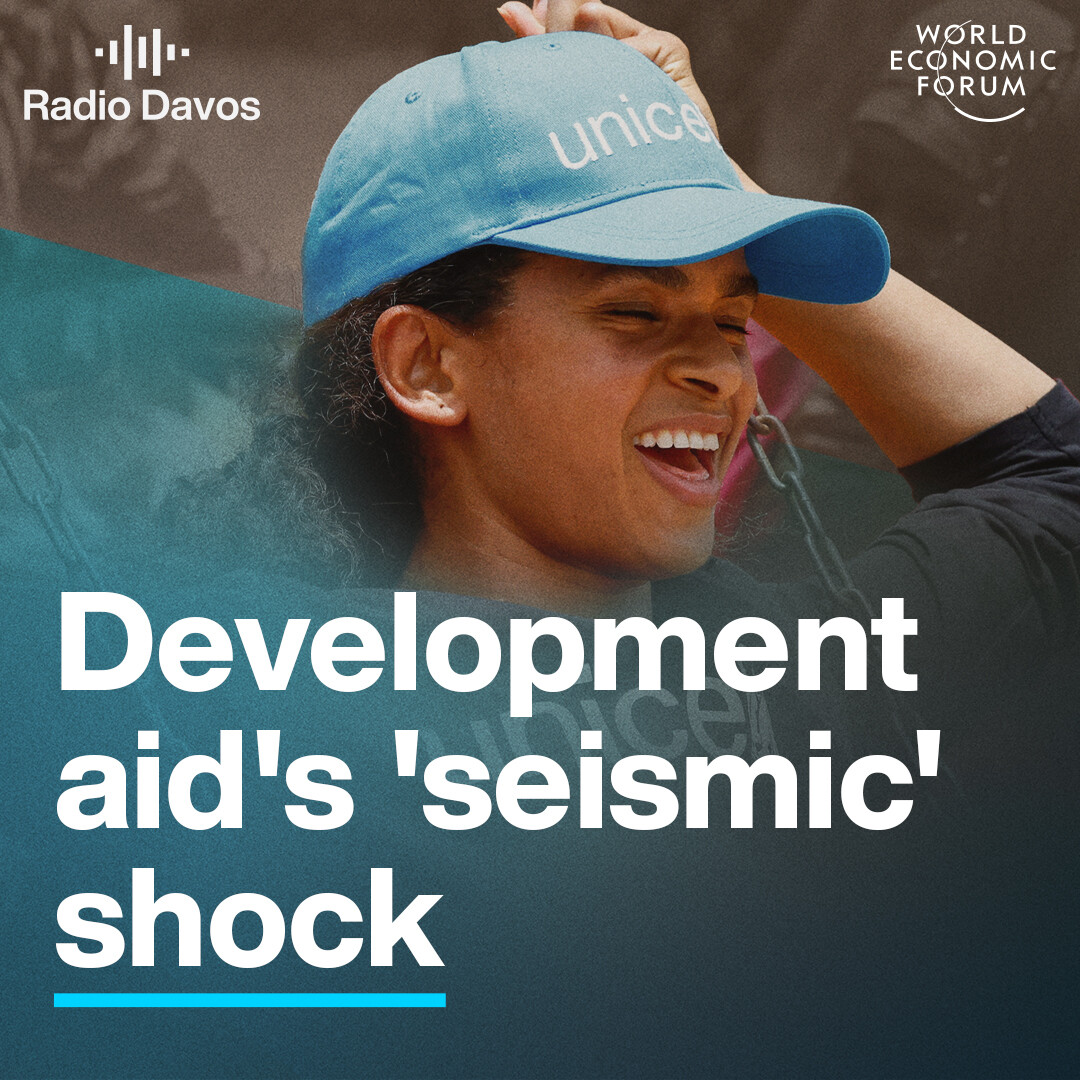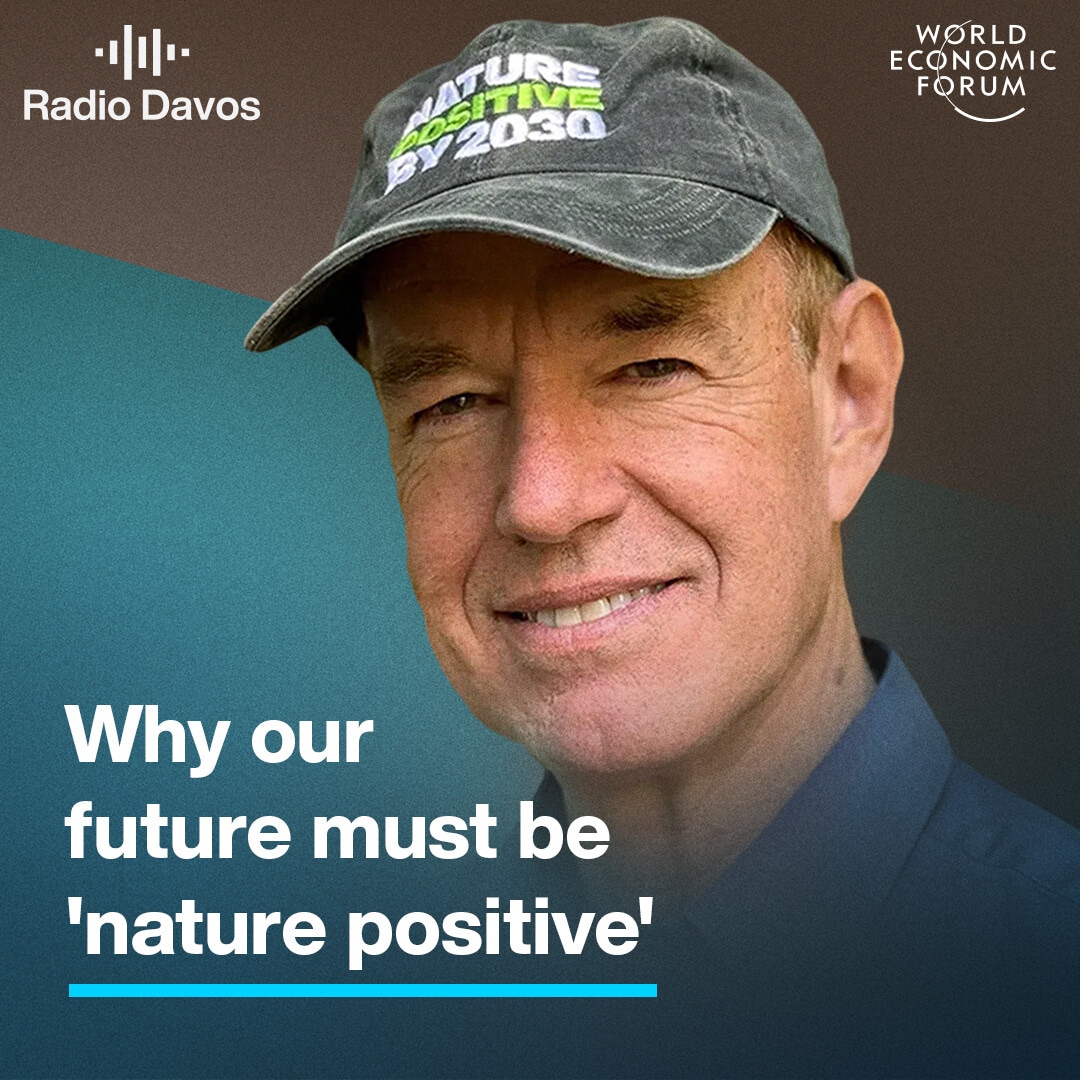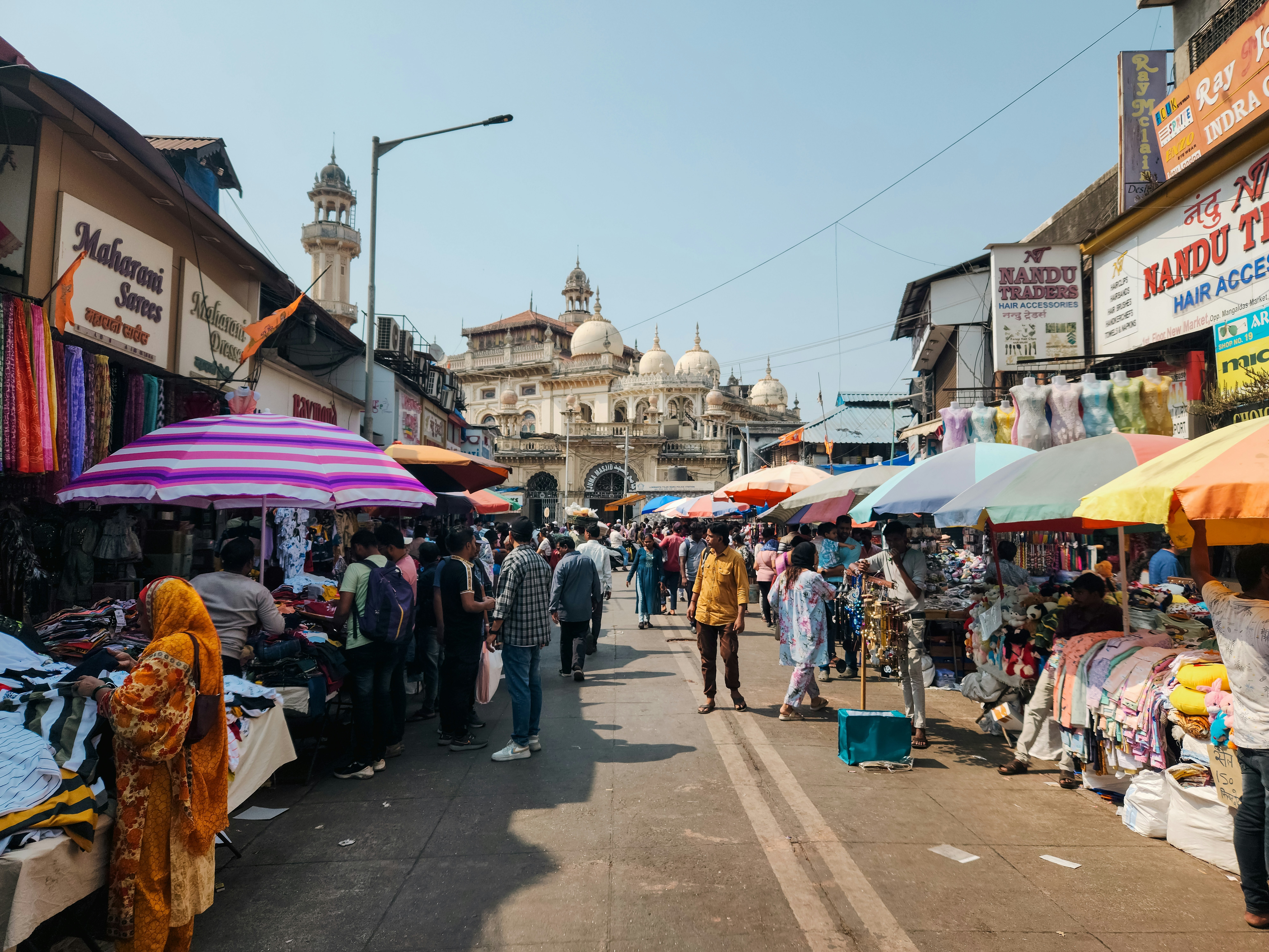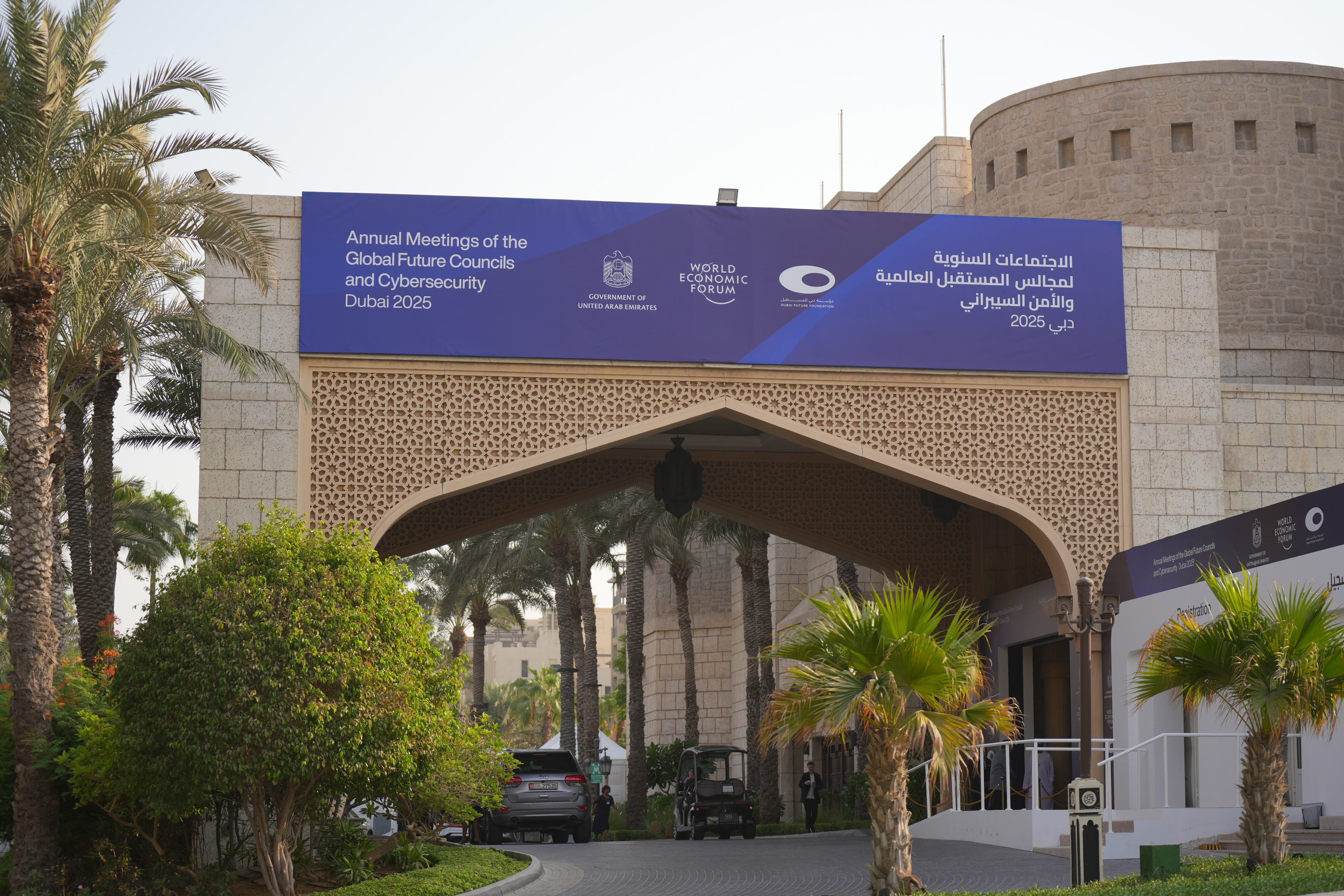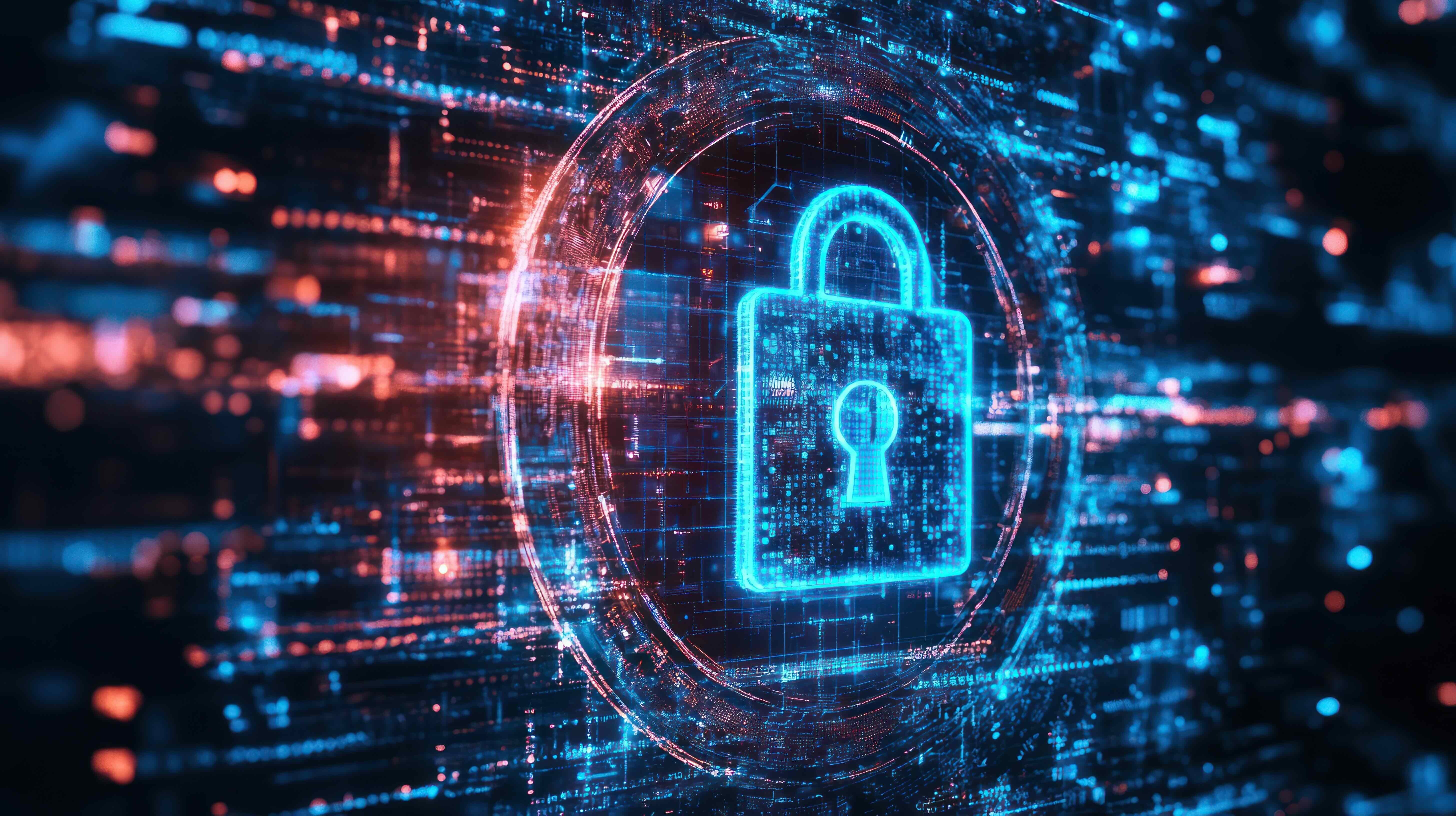Accept our marketing cookies to access this content.
These cookies are currently disabled in your browser.
Tinder Swindler: how 'romance fraud' became a multi-billion dollar cybercrime
Scroll down for full podcast transcript - click the ‘Show more’ arrow
The Netflix documentary 'The Tinder Swindler' is a mind-boggling case of so-called 'romance fraud' in which a charming, handsome - and apparently very rich - man meets women on a dating app - gets them to fall in love with him - and then cons them out of lots of money.
Cecilie Fjellhøy is the Norwegian woman at the centre of the documentary whose life was torn apart by the actions of a conman. A survivor of romance fraud on a grand scale, she now advocates for the rights of, and support for, others who find themselves in similar grim circumstances.
We also hear from Sean Doyle, who works at the World Economic Forum’s Centre for Cybersecurity, on just how widespread romance fraud really is, why it’s a multinational, multi-billion form of cyber crime, and what is being done to combat it.
Links:
Centre for Cybersecurity: wef.ch/cybersecurity
Cybercrime Atlas: https://initiatives.weforum.org/cybercrime-atlas/
Cecilie Fjellhøy's organisation LoveSaid: https://www.lovesaid.org/
The Tinder Swindler documentary:
Accept our marketing cookies to access this content.
These cookies are currently disabled in your browser.
Related podcasts:
Accept our marketing cookies to access this content.
These cookies are currently disabled in your browser.
Accept our marketing cookies to access this content.
These cookies are currently disabled in your browser.
Check out all our podcasts on wef.ch/podcasts:
Podcast transcript
This transcript has been generated using speech recognition software and may contain errors. Please check its accuracy against the audio.
Cecilie Fjellhøy, co-founder, LoveSaid: I met him in person. Looked like his pictures. Really charming. Really opening up to me, like. So we had a coffee. He was talking about his job. He was the CEO of a big diamond company. On the first day I met him, we travelled on this private jet. I fell quickly and I fell hard.
Robin Pomeroy, host, Radio Davos: Welcome to Radio Davos, the podcast from the World Economic Forum that looks at the biggest challenges and how we might solve them. This week: the Tinder Swindler - you may have seen the unbelievable Netflix documentary about how this woman’s dream first date spiralled into a nightmare.
Cecilie Fjellhøy: They came to my work, two special security agents and told me that they had a long investigation on him. They asked for if I had a picture of him. When I showed them the picture they just looked at each other and they nodded. My life was just falling apart.
Robin Pomeroy: Far from a being a one-off case fueling the public’s appetite for bizarre true crime stories, ‘romance fraud’ is actually a global multi-billion dollar industry - part of the booming criminal business known as cyber crime
Sean Doyle, Centre for Cybersecurity, World Economic Forum: It's a very good example of cybercrime. It's playing on a very basic human need. The need to be loved has been around as long as people have been here. What's different? Why is romance fraud changed? Cyber-enabled fraud allows us to do these things at scale.
Subscribe to Radio Davos wherever you get your podcasts, or visit wef.ch/podcasts where you will also find our sister programmes, Meet the Leader and Agenda Dialogues.
I’m Robin Pomeroy at the World Economic Forum, and with this look at romance fraud, cybercrime and the real life case of the Tinder Swindler.
Cecilie Fjellhøy: Everyone thinks that this is old women, vulnerable, sitting at home knitting type of crime. But it's not.
Robin Pomeroy: Do you enjoy true crime documentaries? Maybe you caught this one on Netflix…
Tinder Swindler trailer: You can find a bit of everything on Tinder but one little swipe can change your life.
Robin Pomeroy: The Tinder Swindler is a mind-boggling case of romance fraud in which a charming, handsome - and apparently very rich - man meets women on a dating app - gets them to fall in love with him - and then cons them out of a lot of money.
Tinder Swindler trailer: $20,000; 40,000; $140,000. His life depended on me. That's when police tell me the man I love was never real.
Robin Pomeroy: An extraordinary confidence trick that leaves the anxious viewer very relieved that this is not their own story.
But it is the story of this week’s guest. Cecilie Fjellhøy is the Norwegian woman at the centre of the documentary whose life was torn apart by the actions of a conman. A survivor of romance fraud on a grand scale, she now advocates for the rights of, and support for, others who find themselves in similar grim circumstances.
And we’ll also hear from Sean Doyle who works at the World Economic Forum’s Centre for Cybersecurity on just how widespread romance fraud really is, why it’s a multinational, multi-billion form of cyber crime, and what is being done to combat it.
But first, Cecilie Fjellhøy, interviewed here by my colleague Anna Bruce-Lockhart.
Anna Bruce-Lockhart: You were defrauded out of over £200,000 by a man who went to just the most unbelievable lengths to disguise himself and fool you into trusting him. Can you tell us a little bit about that? I know you've told the story a million times before, but just for the background to the rest of the conversation we're going to have.
Cecilie Fjellhoy: Yeah. I met man first on Tinder back in 2018, and we matched up, and I was the first one who wrote a message to him because I could see that he was travelling a lot around. He had a look that I liked, and the next morning we we met for a coffee in London.
I met him in person. Looked like his pictures. Really charming. Really opening up to me, like. So we had a coffee. He was talking about his job. He was the CEO of a big diamond company, was travelling around, you know, wining and dining clients, signing contracts. So that was kind of his job.
We really connected. He was telling me about his daughter, and at the end of the coffee, he was like, I really want this to continue. I want to see you more. And I was like. Yeah, me too. It is shame, you know? He said, do you want to join us? Like, do you want to join us today? We're going to Bulgaria for a business trip, but I would love for you to join us.
And fortunately at the time, I had just moved to London. I was finishing up a Masters thesis, so I was just working part time. So I was going to work on my Masters thesis that day, so I actually had the opportunity to go with them. So I said yes. And then when we got out from the cafe, I was introduced to this entire team of people working for him who had been like waiting for him. So I met his business partner, private assistant, and met his bodyguard and several drivers, and I met his daughter and the baby's mother.
So you can imagine it was proper, overwhelming feeling of seeing how an entire different life was. And it was wonderful.
Like, so that's when the private jet trip happened. So on the first day I met him, we travelled on this private jet and I fell quickly and I fell hard and we talked every day, FaceTime. He was always available, always caring. Everyone I talked to said that Simon is amazing. He is so caring, is funny, and he was really funny with you.
And I was in that state that I wanted almost to protect him because he had so many people around him, kind of like, you know, if you're a rich guy you have a lot of vultures around. And I was like, walking would just be in my apartment in London and make tacos. And I was trying to kind of get him to relax more.
But is the reason why he had a bodyguard. So he said to me that he had gotten some threats from his competitors because he was doing so well in the business, but everything was going to be fine. But he was the reason why he had the bodyguard, Peter. And after a while I'm getting small drips, you know, he couldn't come to London anymore. And then he was showing me pictures of funeral flowers he had gotten on his door and he was showing me CCTV of a break-in of his apartment in his home country. And I was like, wow. Like, this is, are you safe? Like, I was sending him several messages. So it was like I was really feeling for him cause I was like, what is this life?
Things we're not getting better things. We're only we're getting worse. And around Valentine, I had given him a very nice presents, a very personal one, like ten wonderful things about you that I'd written myself, and I given him a book about how it is to be in a relationship with a Norwegian, and it was like several things.
And very quickly after that he said that he had a security team, that had told him now that he couldn't use his cards anymore because his competitors were tracking where he was in the world by the spend on his card, and that could be detrimental for him. It was like there were death threats that he had on him, so it was providing him a lot of difficulties.
At this point in time then he asked for a favour. The favour wasn't money, you know, it was security. So he's asking me, do you have a credit card that I could just use your name to travel safely under so he could travel safely and be Cecilie Fjellhøy and not Simon Levivev?
And at this point in time, I have to say the request felt so small compared to what he had given me. You know, both experiences, emotional support for me. I was like, this man is so caring. What kind of person would I be now if I would then say, no, you can't even borrow my credit card. With the notion that this was a very difficult situation for him.
So unfortunately, I took up a credit card. I travelled to Amsterdam to see him, and he started using it very quickly and was racking up it very quickly. So I had to then talk to the bank because they were blocking the card, lying to them where I was in the world. If he was in Cape Town and it was blocked, I had to call pretend. 'Hi, I'm in Cape Town. I'm trying to spend $550. Can you open it?'
It was terrible. The amount of pressure when I was working full time. Every time the card was blocked meant that he might be in difficulties and in danger. And that was another ball game for me. And of course, things didn't get better.
It only got worse. When I was visiting him they created immersive theatres around me, where I was with him one day during Easter and we were going to be together for Easter. We're going to travel away. And I was like, finally, you know, you really need to, you know, you're in such difficulties. You really need to get away. But then Peter calls: 'Simon. They found you. They found you. You have to leave now. I have a plane ready for you. I don't know where you're going, but you need to leave now.'
And Simon was, 'I can't like. I've just come here with Cecilia.' But in the end, he left me and we had to, you know, turn off the lights in the apartment, look through to see if we saw the enemies. I was scared, had lock the front door. It was terrible. And you're feeling it yourself.
Further on, he made me have to remove my last name on my Instagram because they were going after me, and changed my profile picture, and it was just insanity.
And then they got attacked in Copenhagen as well, where I got woken up at 2 a.m. where his bodyguard had been attacked, and they just had to flee and he had to go into hospital. And I remember his words so clearly, like, 'we are in a war right now.' We and using the we. But it's not just him, it's us together. It's so powerful.
And that's what I saw. Like mixing the love that I had for him and the care and being scared. You have a very strong cocktail there to get people to do what you want. And he got me to do insane stuff. You know, I took out £25,000 in cash and travelled with that. Who is that? You know, that was not me.
So after a while, you know, I was fearful for him. So I started taking up high consumer debt loans in Norway because he was racking up the bills and it was insanity. So in the end, I'd taken up nine loans and over £200,000 in just 54 days, 54 days.
So that is kind of the story of it, like quickly. But the insanity around the pressure, you never know when a phone call is going to come. You never know when an SMS is going to come in where he's in trouble, or a message where he just says he loves you and misses you and you're like, oh, like, this is like, so he was my one constant. That was him. I was more fearful of what would meet me on the outside when I realised what was happening to me than when I wasn't with him. Because as long as I had contact with them, as long as he was with him, and he was promising me that everything was going to be okay. That was more powerful than take that into what is actually going on here. This is not a healthy, good relationship. This is pressure beyond belief.
Anna Bruce-Lockhart: When did Simon's lies start to unravel? And what happened when you confronted him?
Cecilie Fjellhoy: I think I realised mentally in the end, because he had been travelling around for this big deal, he was going to buy a hotel here in London. And in the end he was going to come to London and either cry on my shoulder or pop the champagne.
And I remember that night when I went to bed and he was going to have this final meeting that was going to decide it all. And the next morning I woke up and I just got a message, 'I lost'. And I was shaking.
Because remember the weeks before, I'd gotten a check that I couldn't cash. I was checking my bank account every single day and no transfers were coming in. Is creeping up on you. That's something it's, you know, and call it the waiting room or sitting in the waiting room, just like in, like what is going to happen. And it's just more comfortable just being there because at least that's what we know than opening that door and going to the doctors and get the news. I think that's how I view it as an analogy, because I think that is so true.
You know, it's almost like domestic abuse victims, they stay and it's the same thing. We stay because this is what we know of. So I think in the end then, I woke up and saw the message and I started like shaking. I went to work, but my body was physically telling me I was almost throwing up. I was physically shaking at work. I was sitting there like, work has been escape, at least that's where I can just think about work. I couldn't even do that anymore.
Even then, I used two days before I did anything. I kept it up with him, and that's when I sent a message to the bank that I had the original credit card for and said I need help that I finally realised something is off there. And that's when they came to my work with two special security agents and told me that they had a long investigation on him. They asked for if I had a picture of him, I showed them the picture. And I remember when I showed the picture and they just looked at each other and they nodded. My life was just falling apart.
And then they were showing me names of people that I had bought flight tickets for. And it was just, you know, knowing what you had been part of, but seeing as well like that they were saying that we're going to go after him and this is his job. Think about it, that you're good at your job. This is his job 24-7. You should not feel bad about what happened to you. He's a professional.
And that was kind of, I was lucky in the sense that that day, that was the kind of words I was getting instead of getting what I got later, that, oh, it's your fault what happened to you. When we have a perpetrator and a clearly big criminal here, like. And I got to know later on that he had already been in jail in Finland for the same thing, different name, but the same things. And he shouldn't even have been in Europe.
It's sad because you thought that you would be protected, but this has really shown me that we need to be much more vigilant, that we are not being protected as much as as you were thinking.
I was kind of having a naive view that if you had been sentenced and you're not allowed to be in Europe, you're not allowed to be in Europe, you know? But he was travelling a lot and some victims of might be vulnerable, have, might be in other situations. I've had just good relationships. All the men that I've been in, relationships have been the best. I hadn't been cheated on. I had never had anyone lying to me. You know, I've always been very fortunate. So I think as well I was a good candidate for Simon to know, okay, this girl, she will fall quickly and she will fall and she will trust to the nth degree, which I did.
Anna Bruce-Lockhart: So you had the security agents who are quite nice to you on the day, but then also you had follow up with the banks and the legal system where you didn't have such a good experience.
Cecilie Fjellhoy: I think that's the hardest part of being a fraud victim is what comes afterwards.
So I had to file it in two countries because most of my debt was in Norway. So I went first to Norway to report it and that was the most horrendous experience. I had to bring my mom there because I was so down mentally to maybe 1.5 hour, and then they dropped it after three weeks.
Even though he had been in Norway, there was stuff that they could have helped out with. And then I reported it in London. He sent me some death threats after I started kind of snooping around. Because you did. Because you met so many people. I met friends, women in Netherlands as well. I was like, who were they? You know, were they in on it? So when he got news of that, he was not really happy.
I think when I then went to London, this is six years ago, the police did not understand what romance fraud was, what I had endured personally. You know, you look at it as, 'Oh, you lost some money. Tough luck'. And since I had sent in some fake documents to the banks that I didn't know what was fake at the time, they decided to make me a suspect. Almost a year later, I had to go into questioning as a suspect, which was horrendous, if you can imagine how that was.
And then later on, over a year later, they dropped my case against Simon, but dropped their case against me as well. So it took two years. If you can imagine, I would have to say two years where I was not viewed as a victim from professional sense. I have gotten an apology from the police in London for now because I made an official complaint. So they said that this would not have happened now. Six years ago, things were very different. But I said, I just want just to learn from this, that this is not how you treat a fraud victim.
Yes, it's a complicated case, but you can still have empathy along the way. And it was very clearly lack of empathy towards me and what I was enduring. Because while I was as well a suspect with the police, I was taken to court by four banks in Norway because I couldn't pay the loans I had taken up. So in the summer of 2019, I was got slapped with a lawsuit. And in Norway you don't get any free legal help. So I had sold my apartment, so I had to use that money to, so I got legal help, but that was as well used against me at court.
So I had to go through two rounds where I was called naive, gullible, just wanted a rich boyfriend. But as well, when it came to the uptake of the loans, I was cunning as well. Which is like how they were portraying me was just really, really like total dismantling of my character. And I felt like you're forgetting that we have a clear perpetrator here still going around defrauding people, but here we are pointing the finger at me, and I think that's what they want. I'm always saying by blaming victims of fraud, do we fall for the con ourselves? And I say yes. Because I'm a living proof that by them pointing the finger at me, you've done exactly what Simon Leviev wanted you to do. The reason why you use my name is the reason why he wanted me to speak to the banks. Is nothing in his name. Everything is in my name.
40% of all crime is fraud. But only 1% of police resources is allocated to fight it. When you think about the intricacy of romance fraud, then how little is being used to tackle it? And I'm thinking about international collaboration here as well. With our case, it was nothing. Nothing. But we see that they can do it. They do it in drugs. They do it in human trafficking. And I think with my case, it was proven that the minute he jumped from country to country, from jurisdiction to jurisdiction, no one could catch him. It was almost like it's impossible to collaborate.
But I think, again, it's the lack of resourcing here, lack of education. Police aren't equipped to deal with this, or how it's been viewed as purely financial. It's not a financial act, it's a human act.
Anna Bruce-Lockhart: It feels to me that there's a bit of a gender angle here, like it's so difficult to prosecute rape and domestic violence and things like that, and this feels like part of that. It feels like such a huge struggle for women to be heard.
Cecilie Fjellhoy: How people are viewing this crime is just so wrong because it's not a women crime. This is not a gendered crime. We have stats from Lloyd's last year that reported to them was 53% men. But because women are the ones speaking up, in different ways, the reports are skewed. Everything is skewed. Everyone thinks that this is old women, vulnerable, sitting at home knitting type of crime. But it's not. Everyone is the victim of this because all of us want love and we are vulnerable when we're seeking love. But I think there's a lot of men suffering in silence.
And I've been at even cybercrime events where people are laughing at it. It was an ethical hacker that had done a speaking, and at the end of it, he came up with a joke. Because a lot of times romance fraud is the joke of the town, you know, like, ha ha, how stupid are they? And he said if he was going to get money the quickest was to pretend to be a young, beautiful woman on Tinder and get an old guy. And people in the audience were laughing because a lot of times it's always an evil woman at the back end. For him, it was an evil woman. And then when we got defrauded by men, we're still evil women and we're gold diggers. It's still that narrative, kind of, that, especially from a young woman's perspective, that is super gendered. I totally agree with you.
And one of the reason why this crime isn't being taken us seriously, you know, that shame and that stigma that men would have, coming forward, at least for us women, we would have kind of more of the support from our friends, from, you know, a loving perspective, because I have that so much. Happier doing this for women is amazing. Yes, I'm doing it from a women perspective that I've been treated horribly in the sense that you're a woman and you're being very judged based on how you look or you know, just for being a woman.
But this crime is not gendered. Everyone can be a victim of this. And I think that is what I am really passionate about.
Anna Bruce-Lockhart: I want to get on to LoveSaid, this lovely NGO of yours. And what was a moment when you're like, yes, I'm going to do this. And what was the enabling factor?
Cecilie Fjellhoy: So I started off talking to tons of other NGOs looking at what they were struggling with, got a lot of information.
So after 'The Tinder Swindler' blew up back in 2022, I did a webinar and then I met this amazing woman called Anna Rowe, and she has several social media called Catch The Catfish. And I was like, this woman is incredible. Her thoughts, you know, ambitions, what she was doing, is so aligned with what I want to do. Like she's helping victims on a daily basis, and her ambition of what she wanted in the future was to make it bigger, help even more people, be a support centre, but change things as well.
We have a lot of support, okay, we're here for the victims, but we want fewer victims or we want more victims to be taken care of properly. So I was like, I want it to be a think tank as well that will actually do more of the research that we need.
There are no numbers, for example, on suicides, on foreclosures, on sick leave. What is this costing society? We don't have any numbers, so it's super difficult to talk about something or get anyone to take action. Get politicians to take action, social media companies to take action.
So that is what that was. So we instantly connected and we were thinking, okay, let's create something that will make an impact. And that's when LoveSaid was born, a year ago. And we've been working throughout the last year, business plans, doing several talks around the UK where we have been talking to banks, police forces, which has been amazing, to see that they're changing, that they see victims as resources, that we have something to come with. LoveSaid can provide the training on how to speak to fraud victims, how to treat them. But I think what will be, you know, the heart and soul of the organisation is the support centre, that people know that they will come to us with no judgement.
Justice will look different for everyone. Some people will have their cases dismissed, but at least they have the mental health support that we will provide that they can get back on their feet, they can get their lives back. It's money, you know, and we can heal as people. And we have so many people coming to us that we're helping already saying, it's just so nice knowing that that you're here, that you're responding. And then police forces as well. It would be so nice for us to know that you're there, that we could send people to you, that we know that they will kind of be there for us. And that is specifically for romance fraud.
Anna Bruce-Lockhart: Can you tell me a little bit more about what you offer to a victim?
Cecilie Fjellhoy: When they come to us, it's always one on one, first of all, because we are working on making a digital step by step guide so they will get help in their situation. But right now they send in a message to us. We come back to them. We ask, you know, where in the world what kind of fraud did they take up loans? And then it's both kind of safeguarding them. A lot of times these people find them again and they might try to recover their money and might get scammed again.
So it's both the practical help on actually how to report it, because a lot of the times that is not as easy. When people are in trauma, they don't know what to say, they don't know what is important, what is not important. Reporting to banks is to educate them with, as I said, with the research that has already been done and what happened to them so they can get healing from that.
We have a peer support group every month now, so the victims can meet each other, that we are guiding them through different things. And in the future, we would love to have different experts coming in and talking about, you know, money, financial. So it's actually just helping them through their journey.
We maybe helped like 6,000 in total, like one on one throughout the years. We help family and friends as well. We have sometimes them coming to us.
You see a lot of it actually. Family who are seeing either their mom, dad, sister, who are in difficulties that they're being scammed. They refuse to believe. Because if you go to a fraud victim, you know the stigma around that, 'you're stupid if you get defrauded'. If you've been defrauded, your guard is up. If we take them on a journey, the five wise, I call it, if you can explain it in five ways, it's not a good idea, because if you stop being able to explain it on the third one, it's a bad idea. If you don't know enough about your partner or why he needs the money, that you can't explain it. Bad idea.
So you're taking the victim on the journey themselves because ask themselves, they themselves need to realise it. So it's kind of just giving them the tools, and sometimes it's just like putting that little doubt in their mind. And in the end they might come back a week later, two weeks later. This is a long game.
This is why banks sometimes are not the best people to approach someone that they think is being defrauded, because they don't have the time. Remember when the first bank blocked my card? They said, we know you're not the one using your card. And I knew I've done something wrong by giving him my card, you know, you're not supposed to do that. So I was so scared because it was so accusatory and so like, I felt that I was going to be in trouble. That is not how you do it.
If you knew that I wasn't using my card, most likely I was being defrauded, why didn't you contact police? It was a lot of money. Was £68,000 in three weeks. Why don't you reach out to me again? Kind of in a more like, is everything okay with you? Are you going through stress? There's several things you could do.
So I think LoveSaid is kind of like an extended arm of this. And we really want to be, in addition, you know, to what the banks are already doing. They're doing a lot of great work, but they don't have the time.
Robin Pomeroy: Cecilie Fjellhoy was talking to Anna Bruce Lockhart.
Wouldn't it be nice to think that romance fraud is rare - that it couldn't happen to you or your loved ones? Unfortunately that is not the case, as you'll hear now from Sean Doyle, an expert on cybercrime at the World Economic Forum.
Sean Doyle: Sean Doyle. I'm lead for the Cybercrime Atlas at the World Economic Forum.
Robin Pomeroy: So, Sean, Cecile's story is a fascinating one, quite disturbing in many ways. But is it really cybercrime? How does it relate to the work you do at the World Economic Forum?
Sean Doyle: So it's a very good example of cybercrime.
It's playing on a very basic human need, for the need to be loved has been around as long as people have been here, and the habits that people have of trying to trick each other has been going for just as long.
I think what's different and why is romance fraud changed is that cyber enabled fraud allows us to do these things at scale.
Cecile is one example of a very, very large group of victims. This really is a very old form of fraud. What's changed is that the internet allows us to do this at scale and across countries.
So very often these scammers are not sitting in the same country as the victim. That allows them to go after multiple victims at the same time.
Now, to give you an idea of just how profitable this is for organised criminal gangs, they've started seeking out cyber experts by tricking them into coming to a good job, let's say moving from Brazil to Vietnam with an option to work in IT, and then enslaving them to work in cyber fraud farms. So this is very much something that's enabled by the internet.
And when we think about cyber security, I think that you've got to think, why do we have cyber security? It's in order to protect us from cyber criminals. And in this sense, what we're seeing with these romance frauds, it's it's a good example of the type of behaviour we see by cyber criminals in relation to frauds they undertake against companies, in the manner in which they identify and then take money away from victims.
So yes, this is very much a cyber enabled fraud.
Robin Pomeroy: Cecilie makes the point that probably there's lots of this stuff that's under-reported, probably because people are ashamed or embarrassed. It's so personal isn't it? I mean, it's amazing her story, which might be extraordinary because it involves private jets and apparently a cast of characters that she met in real life. There's probably a lot of more low-level, perhaps, stuff that doesn't involve a private jet and a cast of characters, but as you say, maybe an actual human being who is not who they say they are, who is employed by a criminal gang.
Do we really know how widespread this kind of criminal industry is?
Sean Doyle: Look, I can say this much. It is enormous and it is global.
The Global Scam Alliance has put out an estimate of, I think, $1 trillion in profits. We come back to recent incidents we've had of 220,000 plus people being recorded as being trafficked to work in cyber fraud farms. We can really say that that is probably the tip of the iceberg. We've seen a large number of arrests in countries like the Philippines, Thailand, India and across Europe, where criminals who are not previously into cybercrime are getting involved in this simply because of the amount of money they can get out of it and the reach they have through the internet to get a very large number of victims.
Robin Pomeroy: It's kind of a low risk, high return business model, maybe?
Sean Doyle: At the moment.
Now, I would say there is some good news, particularly since December of last year, over the last 5 or 6 months, we've seen that law enforcement are getting better at working within country, cooperating with law enforcement in other countries, which is absolutely necessary if the victim is sitting in Norway or the UK, as Cecilie was, but the criminal might be in a completely different part of the world. But they're also getting much better at taking advantage of the expertise in the private sector.
So, to give a recent example, in the UK, what's called a cybercrime as a service group was taken down, a group that was simply providing like the equivalent of software services that you get for a corporation but aimed at criminals. It's called LabHost, was taken down. They had about 70,000 victims, and it took collaboration between 37 different sets of law enforcement in different countries to take them down.
But actually the leads that that led them to, the information that led the police to this group, came from a private sector alliance called the Cyber Defence Alliance, which is, I think, funded by financial services in the UK, and aimed at exactly identifying who the criminals are that are going after victims, the infrastructure they're using, the IT they're using, and identifying ways of breaking that up.
Robin Pomeroy: Yes. So I was going to ask you what should we do across the horizon of the stakeholders here, companies which would be banks, and we heard from Cecilie about how the banks are investigating, authorities, police authorities, policy makers and even individuals. I mean, are there some, are there recommendations that the World Economic Forum is making?
Sean Doyle: So starting with individuals, it is just to be very aware that this is always a possibility, that if you meet someone on the internet, even if you're talking to them for a very, very long time, and they will trust, we do have to be careful about who they are. So what I would say is, if somebody is offering you an investment opportunity or for some reason demanding cash and saying they really need us, really think twice unless you've met them in person and are very certain of who they are.
What governments can do is think about building capacity to identify, stop and prosecute these kind of cyber-enabled frauds, which is easier said than done. That means looking at how they fund their police in their home country, but also how they interact with law enforcement across other countries. So whether bilaterally or via an international group like Interpol. So thinking about capacity building.
But then an awful lot of the skills for identifying cyber crime sit in the private sector. The ability to identify and deal with the infrastructure being used by criminals. Their IT infrastructure sits with the private sector.
So it's very important to identify ways of allowing government agencies to collaborate with the private sector to share information on these criminals, but also allowing private sector members to work together. Because what we've seen from the work done by the Cyber Defence Alliance, which is in the financial sector, but also by a Forum-hosted project called the Cybercrime Alliance, where we brought together cyber experts from a number of different sectors, is that when you bring experts from different areas together, they can create new forms of information on how these criminals operate, what they're using to operate, and to help us kind of map out what they're doing and understand where we can cause the most pain and disruption for them.
Robin Pomeroy: You talk about mapping out, you run this thing called the Cybercrime Atlas Initiative. Could you tell us what that is?
Sean Doyle: So the Cybercrime Atlas brings together experts from the forums, network of cybersecurity companies, IT companies, financial services, cryptocurrency, anybody who has a role in disrupting criminal activity online. We have support from about 25 companies and founded by Microsoft, PayPal, Santander and Fortinet.
But what these group are doing, we're getting investigators working just on open source research. So overcoming that barrier that companies have of sharing their own information or sharing personal information, what they are doing and saying, can they just using what's out there in the internet, build up something new and map out the activities of cybercriminals and how they go about doing their business with the aim of us being able to disrupt them more effectively.
And, you know, that's an experiment. I'm glad to say that the first part has worked out very well. We are able to create new and valuable research on these criminal groups, and it does have operational value. What we need to see in the Forum then, is how do we go about scaling this so it can have greater global impact?
Robin Pomeroy: Have you noticed any differences, any progress kind of in the real world? Cecilie's story was a few years ago. She tells us about how she felt she was being blamed. Obviously she had been lured into doing some wrong things herself, but she says she was treated very badly and she could understand why people wouldn't report this kind of stuff for a number of reasons. Do you think things have improved since then, which which was several years ago?
Sean Doyle: So we're seeing improvements in a couple of areas.
First of all, countries like the UK do have requirements that victims get some sort of restitution, some sort of their money back. That could be spread further.
One reason why people might have hesitated to go to the police before is, frankly, because the police often weren't in a position to do much. So we're finding that the capabilities and capacity of police to identify and deal with cybercrime is going up, but also their willingness to work with police agencies and other countries, and the effectiveness of that.
So we're seeing that people are more able to identify and stop cybercriminals, but also the speed of response is going up, and the police have become much better at identifying really where the most harm is being done.
So you'll see in countries like Thailand, the Philippines, India, over the last 3 or 4 months, there have been a lot of arrests of the criminals, and they've identified where victims are being trafficked to work in cyber scam farms. And they're finding ways of releasing these people who have been trafficked and really for double victimisation because they're victims of trafficking and they're being forced to commit crimes against other people.
One thing that does need more emphasis is educating the public. So that people should have more protection. They should feel that if they've done something a little bit wrong or been tricked into doing something that either makes them feel ashamed or that they're at risk, that they're given the kind of protections that allow them to go forward in confidence and report.
So that's awareness raising and not just saying we're changing things, but showing how the victims are protected when they report crimes.
Robin Pomeroy: And here's a question that probably gets asked in every single interview I've done over the last 18 months, artificial intelligence, because you talk about thousands of people being trafficked to take part in this criminal activity, which is totally surprising to me. But I guess in the future, or maybe already, you can automate. You can create personalities that seem real. Is that something you're already seeing, or is it something that could become a risk in the future?
Sean Doyle: So first of all, it's hundreds of thousands being trafficked. That's how big the problem is.
With regards to AI, look, we're seeing elements of it being used, such as voice deepfakes and video deepfakes. And they're having a measure of success.
I would say with things like generative AI, what that has done is it's made the email campaigns much cheaper to run and much more effective.
Whereas before, let's say, if you were sitting in an English speaking country, you might get a message from someone that it looks very much like broken Russian and might make you suspicious as to whether or not this was something you should click on that if you didn't. Gen AI allows for criminal groups to send out messages that are convincing in lots more languages, lots more cheaply.
But, you know, that's kind of the headline element. I would say that actually the, the uptake of AI by criminals has been incremental. We're not seeing enormous changes as of yet, but the issue is that those incremental changes over time, given a few years, could eventually have a big impact.
The positive side of the story is that cyber defenders tend to be making better use and more effective use of AI than the criminals at the moment, but that, there's an imbalance in that the what we call the cyber equity gap in the World Economic Forum's Centre for Cybersecurity, that, over time, countries that have more funding and companies that have more funding are doing better at their cyber security. But actually it's not a case of that the smaller ones are just standing still while the others take away, they're going a bit backwards. Because there's a lack of skilled professionals in cyber security. You know, in the legal world, these move towards the larger companies where they can get more money, and you'll see that the criminals are responding to that skills deficit by trafficking people and tricking them into work.
So all of those coming together, AI is not yet a game changer for criminals. It is having an impact. But, over a period of years, it could really seriously change things in criminals' favour if we are not careful.
Robin Pomeroy: Sean Doyle, of the World Economic Forum's Centre for Cybersecurity. You can find out more about the Cybercrime Atlas Initiative on our website - links in the show notes.
In this episode you also heard Cecilie Fjellhøy, from the Netflix documentary The Tinder Swinder. Her organisation is called LoveSaid.
Please subscribe to Radio Davos wherever you get your podcasts and please leave us a rating or review. And join the conversation about podcasts on the World Economic Forum Podcast club on Facebook.
This episode of Radio Davos was presented by me, Robin Pomeroy, with reporting by Anna Bruce-Lockhart and editing by Jere Johansson. Studio production was by Taz Kelleher.
We will be back next week, but for now thanks to you for listening and goodbye.
Hosted by:
Topics:
CybersecurityMore episodes:
More on CybersecuritySee all
Akshay Joshi
November 5, 2025
William Dixon
October 30, 2025
Akshay Joshi
October 29, 2025
Jon Jacobson
October 28, 2025
Mauricio Benavides
October 27, 2025


